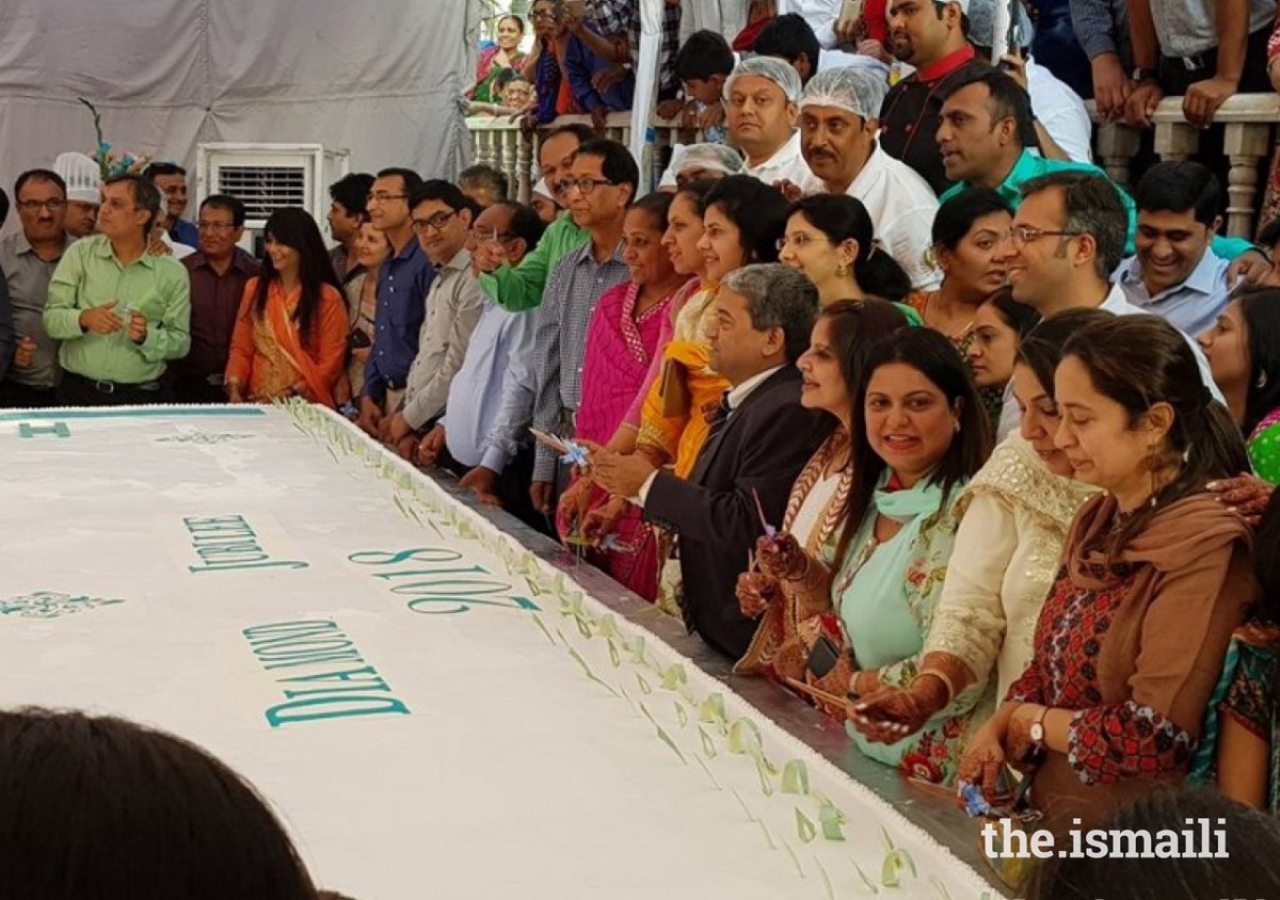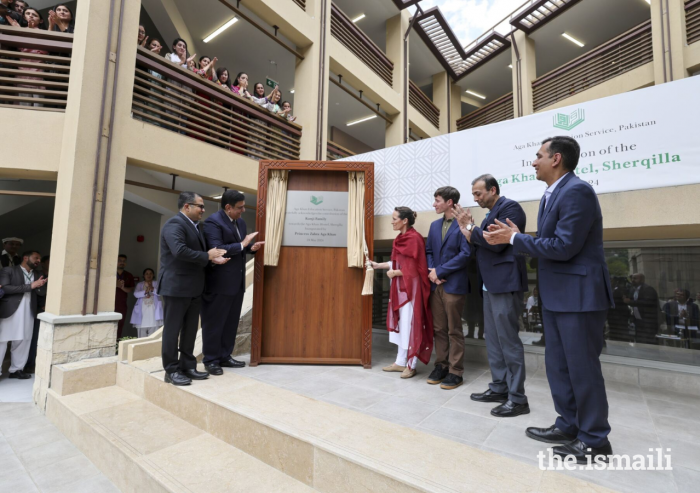On 26 February 2018, India’s bakers alliance made history. The United Bakers Co-operative Society Limited (UBCL) whipped up a record-breaking 940 kg cake to commemorate Mawlana Hazar Imam’s Diamond Jubilee visit to Hyderabad. Featured prominently in the official film of the India visit, the commemorative cake made UBCL a familiar name in many Ismaili households. But it isn’t only the cake or the record that makes UBCL special. The UBCL story is an archetypal example of how working together can create pathways to economic prosperity for everyone.
Created with a loan of 10,000 Rupees, 57 members, and a dollop of visionary thinking, the UBCL — now 20 years in the making — has become one of the most successful alliances housed under the aegis of the Aga Khan Economic Planning Board (AKEPB) for India. As the name suggests, the alliance brings together Ismaili-owned bakeries in Hyderabad, under the umbrella of this structure which seeks to aggregate and promote their collective business interests.
While the alliance began in the year 2000, it has been able to firmly consolidate into a robust and sustainable organisation over the last decade. UBCL now counts a total of 316 members. The year 2011 marked the opening of its central purchasing unit (CPU), a designated space managed by the UBCL, which acts as a one-stop shop for all its members. Starting from 1,400 square feet and moving to a 3,500 square feet space with 15 salaried employees and two delivery vans in just nine years, the CPU is at the heart of UBCL’s success.
“It is the power of bulk buying,” said Rafiq Umani, a director on the board of UBCL, as he reflected on the principles behind the alliance’s success. The alliance leverages its sizable network of Ismaili bakery owners to seek discounts and deals from major multinational consumer goods companies including Coca Cola, Cadbury, Nestle, Britannia, ITC, and Parle. This strength of numbers allows them to negotiate agreements at sizable discounts, giving these bakeries a competitive edge in the market. With discounts ranging from 15-20%, the benefits that a member can get because of their affiliation to UBCL are significant.
Notwithstanding the monetary benefits that UBCL brings to its members, it is the underlying belief in this establishment as a trustworthy and representative body that is the core of its success.
Hussain Ravani, a bakery owner in Chiragali, Hyderabad and a member of UBCL, concurs.
“Buying in bulk from an outside vendor is a risky business. There is a persistent fear that one is being cheated. However, with UBCL, all I need to do is place an order for products on the phone. I know I can completely trust the alliance with their delivery; and even if a problem arises, I know I will be heard and an exchange will be initiated,” Ravani said.
This sense of trust in UBCL’s mandate runs deep and the work of the alliance has helped to build this over time. UBCL assists new members in identifying locations for bakeries, in recognising possible partnerships between different members of the Jamat, and in setting up machinery and quality guidelines. Its CPU becomes the natural destination to procure products for new bakeries. Additionally, a monthly scheme with a major multi-national ensures a fixed basic income from the very first month of operations, accompanied with a series of other discounts that enable UBCL-affiliated bakery owners to sharpen their competitive edge in the market.
UBCL also holds regular business development and other industry-related educational initiatives for its members to enhance their business acumen. Nadir Jindani, a bakery owner who relocated from Porbandar, Gujarat to Hyderabad, credits these recurring initiatives as being practical and useful.
Central to UBCL’s growth and its ability to create value for its members has been its strong and silent financial partner: the Ismailia Co-Operative Credit Society (CCS), a financial partner since the early days of the alliance’s inception. This partnership is one of the quintessential examples of institutions coming together to create a lasting and far-reaching impact on the lives of our Jamat.
The story of Azad Khoja, a 29-year-old bakery owner from Silvassa — a small town in the union territory of Dadra and Nagar Haveli and Daman and Diu, bordering the state of Gujarat in India — is uniquely illustrative of the life-altering impact of the collaborative partnership between UBCL and the CCS. Azad came to Hyderabad at the age of 26 in search of a source of income and a better quality of life. From working as a salaried employee, he has now been able to become a partner in that bakery, whilst still working as a full-time employee of his own bakery. It all began with a single loan of INR 1,00,000 from the CCS, the trust of a local guarantor, and personalised mentorship and support. Azad is now in the process of relocating his family to Hyderabad as his bakery enterprise grows.
The close collaboration and shared vision of the UBCL and the CCS has created sweet stories of success for many of UBCL’s members. Along with the credit that the CCS provides to several UBCL members, it aims to be a financial partner to help refurbish, enhance, and reinvigorate smaller or worn-out bakeries into spaces that comply with modern standards of the business.
"There is no doubt in my mind that the future will be won on the basis of the alliances," said Farah Bhanji, chairperson of the AKEPB. "Increased competitive pressure, new regulations, evolving customer demands, and new technologies are creating unprecedented change. UBCL has created an example in India of the strength of an alliance and we hope in future to leverage this across alliances and geographies in the Jamat," she said.
Steering UBCL towards this wider best practice agenda has been the Aga Khan Economic Planning Board for the USA. As a silent but sound mentor, AKEPB USA has worked with UBCL over the last three years on a number of initiatives. The two organisations have discussed strategies to negotiate more lucrative deals with companies and ways to compete with big-box stores and subsequently a highly competitive online food market.
As always, the road ahead is equally long as the road that has been travelled so far. The current successes of UBCL are only the first step in a long road to innovation, development, and growth. The CPU has been a rewarding achievement, however, UBCL’s imminent goal is to open a central manufacturing unit. The fundamental aim and vision, however, remains the same: to voice the evolving needs of the bakers in Hyderabad to become bigger and better, together.








